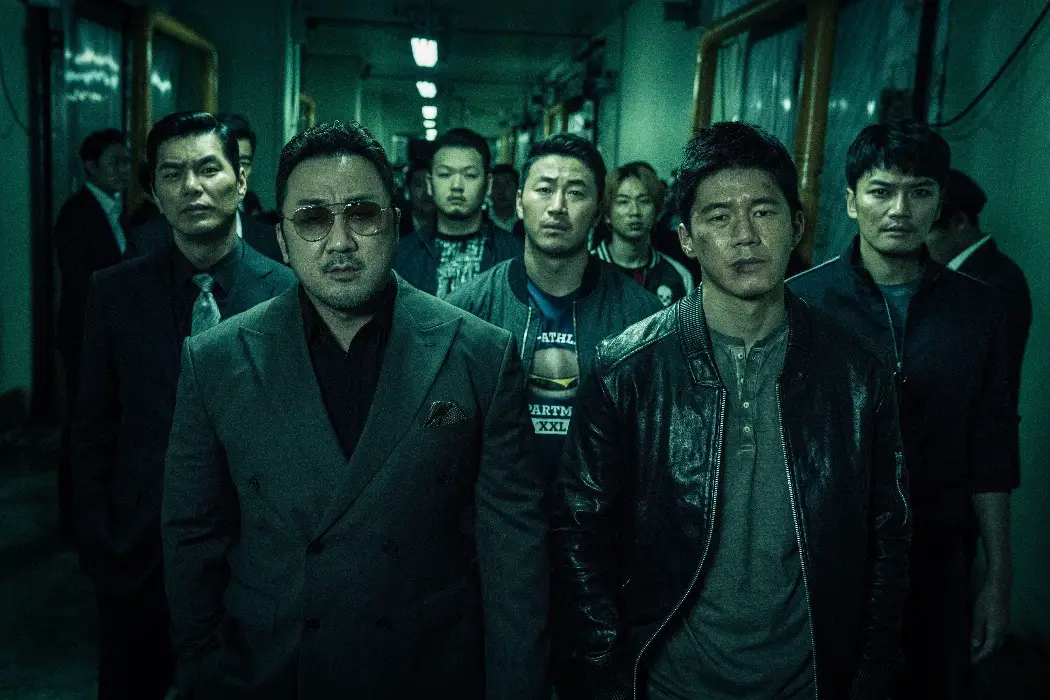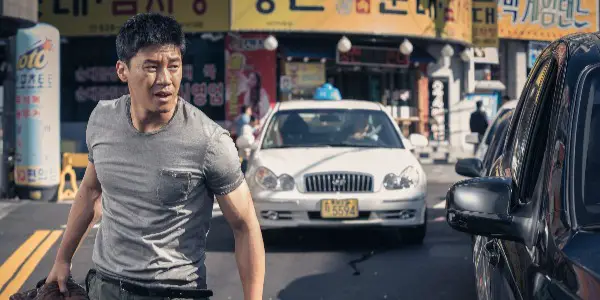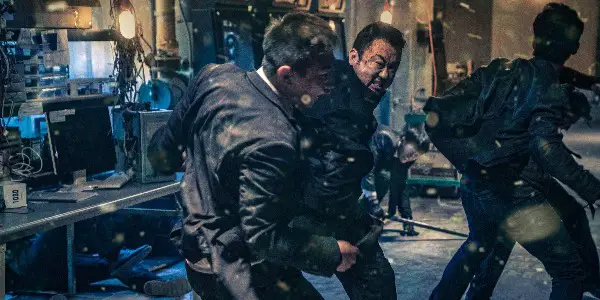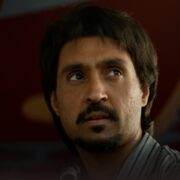THE GANGSTER, THE COP, THE DEVIL: Evil Comes In Many Forms

Alex is a 28 year-old West Australian who has a…
Including “The Devil” in the title for your brand new South Korean revenge thriller is bound to evoke the horrifyingly violent but sublime pleasures of Kim-Jee Woon’s brutal I Saw The Devil, which pitted a pissed-off secret agent against a ghastly killer. In Lee Won-Tae’s sophomore feature The Gangster, The Cop, The Devil, a similar hypothesis is skilfully brought to vicious life on-screen; what if a gangster, scorned by an attack on his own life, decided to track down a prolific serial killer himself?
It’s a neat premise that allows for the elements of your standard ‘Se7en-derivative’ rogue cop vs murderer narrative to be cranked to the extreme, with a lone killer’s detached sensibilities colliding with a seemingly callous equal. A gangster may not kill randomly, but they aren’t afraid to wield a knife when headed for hard times – think The Good, The Bad and The Ugly, but remixed within South Korea’s trademark blood-soaked vengeance-seeking sensibilities.
Killer VS Killer
It helps when that gangster is played by Don Lee, aka Ma Dong-Seok, the barrel-chested mountain of a man who gained worldwide prominence with Train to Busan, perfectly cast as the desperate father who must punch his way out of a zombie apocalypse. The Gangster, The Cop, The Devil also uses his physicality flawlessly, matching his brute force with a keen emotional intelligence that is rarely rewarded to characters such as his.

After a tense business meeting with a rival gangster, Jang Dong-Soo (Don Lee), who runs an illegal underground gambling machine empire, makes the mistake to drive home alone at night. While a foolish endeavour for anybody of such high prominence, Jang is targeted by a mysterious serial killer, who is only identified as K (the titular Devil, as it were). K’s murderous M.O. is simple: he rear-ends his victims and when they leave their car to inspect the damage, he viciously stabs them to death with a rusty kitchen knife.
Only this time, when his jagged blade is drawn, Jang fights back, with both barely surviving the encounter. As Jang’s re-cooperating, he’s approached by Jung Tae-seok (Kim Moo-yeol), a cavalier cop who plays by the edges of the book – he’ll enforce the law, but by any means necessary, much to the chagrin of his frustrated boss. Tae-seok is the only cop to latch onto the idea of these random road-side slayings being the work of a silent serial killer, thus a shaky alliance is formed between the two opposite sides of the law, as Jang has the manpower and Tae-seok has his police resources.
Lethal Weapons
It’s not quite the wacky buddy cop caper that one may expect from that premise, but it doesn’t stop Lee Won-Tae from milking their unstable situation for as much commercial potential as he can within the film’s brisk sub 2 hour runtime.
Besides the increasingly arbitrary deaths caused by K (who remains at a constant distance from the audience at all times, a shadowy presence that makes him more MacGuffin than man), this is a friendlier mainstream outing than say I Saw The Devil, lightened by regular intervals of fist fights, car chases and argument-ending slaps to keep attentive viewers entertained, all adeptly layered with Cho Young-Wuk’s rhythmic guitar score that keeps its ‘rebellious’ tone stabilised.

Park Se-Seung’s cinematography also delivers a helpful contribution towards this slick presentation, bathing South Korean night-life in a beautiful blend of neon lights and rain-soaked sidewalks that we’ve come to expect from the best of South Korean crime cinema. This is also an appropriate statement about it’s piquant plot, which plays like a compendium of the best of Park Chan-Wook, Kim-Jee Woon and their contemporaries that exploded in the early 2000’s in the wake of Oldboy’s well-deserved cult success.
Deaths are frequently delivered swiftly and without remorse, personal morality is merely a tool for manipulative rhetoric, the line between law-maker and law-breaker is blurred beyond repair, all culminating in a dingy warehouse where justice is to be served with the same tools we’d expect from the Saw franchise. It’s not totally derivative, although it lacks any real narrative invention or third-act surprise twists that’ll leave people talking – it’s a straightforward venture, but in a sea of similar imitations that have flooded the market in recent years, it’s technical ingenuity and crowd-pleasing confrontations guarantees that it stands above its peers.
The Gangster, The Cop, The Devil: Conclusion
Coming off its successful debut at Cannes and promptly picked up for an upcoming Sylvester Stallone-produced American remake, The Gangster, The Cop, The Devil’s expected inhumanity and ensuing catharsis inhabit the major elements of the ruthless world of South Korean crime thrillers to an effective degree.
One may accuse it of being derivative due to it’s grimy aesthetics and refusal to revolutionise such a niche style of story-telling, but Lee Won-Tae energetically mashes all these moments together in many refreshingly compelling ways which entails an experience that for once in this genre, doesn’t make you feel absolutely awful for sitting through it.
Are you excited for this film? Let us know in the comments below!
The Gangster, The Cop, The Devil is out now in select Australian and American theatres.
Does content like this matter to you?
Become a Member and support film journalism. Unlock access to all of Film Inquiry`s great articles. Join a community of like-minded readers who are passionate about cinema - get access to our private members Network, give back to independent filmmakers, and more.













